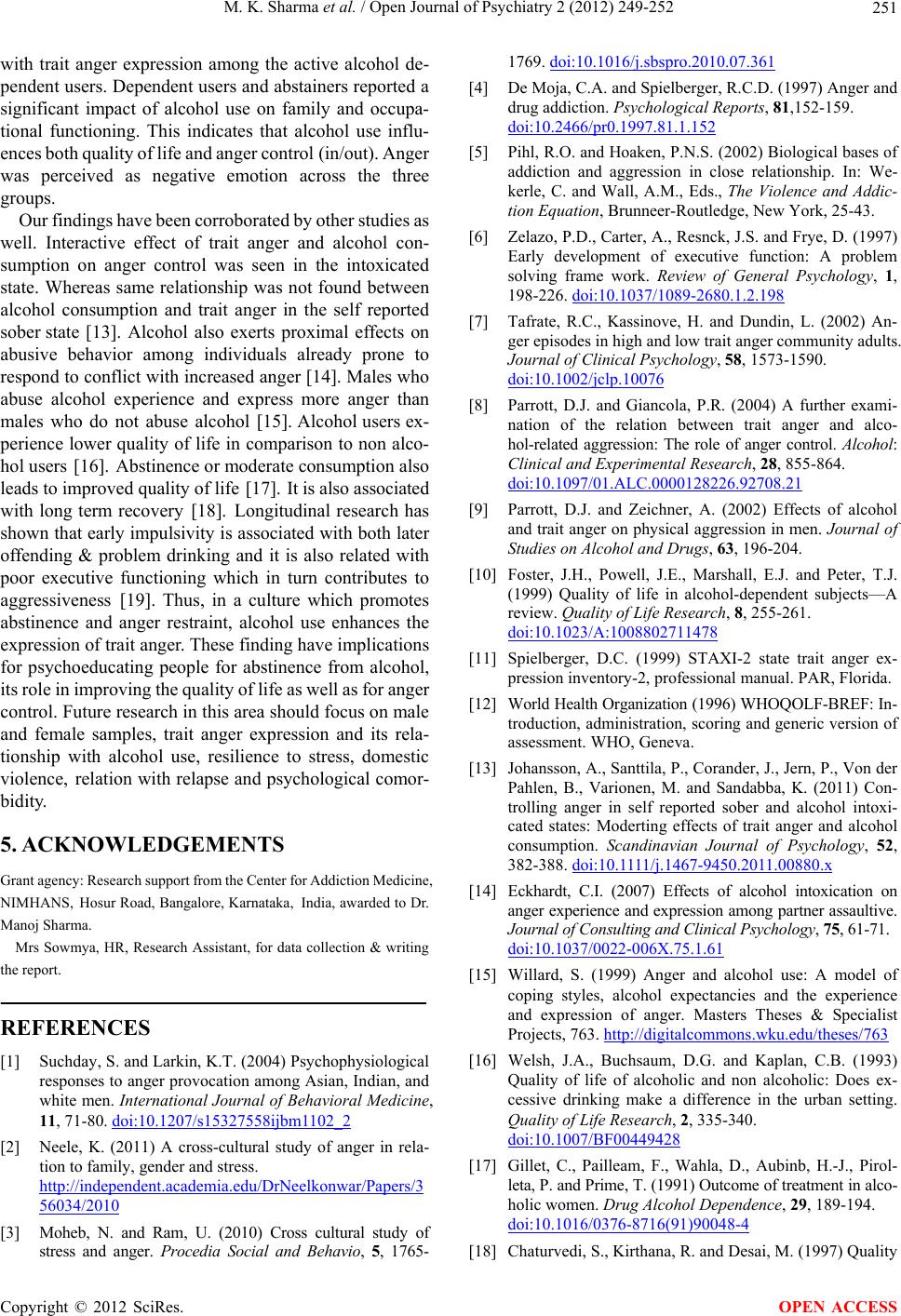
M. K. Sharma et al. / Open Journal of Psychiatry 2 (2012) 249-252 251
with trait anger expression among the active alcohol de-
pendent user s. Dependent users and abstain ers reported a
significant impact of alcohol use on family and occupa-
tional functioning. This indicates that alcohol use influ-
ences both quality of life and anger control (in/out). Anger
was perceived as negative emotion across the three
groups.
Our findin gs have been c orroborated by other studies as
well. Interactive effect of trait anger and alcohol con-
sumption on anger control was seen in the intoxicated
state. Whereas same relationship was not found between
alcohol consumption and trait anger in the self reported
sober state [13]. Alcohol also exerts proximal effects on
abusive behavior among individuals already prone to
respond to conflict w ith increased anger [14]. Males who
abuse alcohol experience and express more anger than
males who do not abuse alcohol [15]. Alcohol users ex-
perience lower quality of life in comparison to non alco-
hol users [1 6] . Abstinence or moderat e co nsumption also
leads to improved quality o f life [17]. It is also associated
with long term recovery [18]. Longitudinal research has
shown that early impulsivity is associated with both later
offending & problem drinking and it is also related with
poor executive functioning which in turn contributes to
aggressiveness [19]. Thus, in a culture which promotes
abstinence and anger restraint, alcohol use enhances the
expression of trait anger. These finding have implications
for psychoeducating people for abstinence from alcohol,
its role in improving the quality of life as well as for anger
control. Future research in this area shou ld focus on male
and female samples, trait anger expression and its rela-
tionship with alcohol use, resilience to stress, domestic
violence, relation with relapse and psychological comor-
bidity.
5. ACKNOWLEDGEMENTS
Grant agency: Research suppor t from the Center for Addiction Me dicine,
NIMHANS, Hosur Road, Bangalore, Karnataka, India, awarded to Dr.
Manoj Sharma.
Mrs Sowmya, HR, Research Assistant, for data collection & writing
the report.
REFERENCES
[1] Suchday, S. and Larkin, K.T. (2004) Psychophysiological
responses to anger provocation among Asian, Indian, and
white men. International Journal of Behavioral Medicine,
11, 71-80. doi:10.1207/s15327558ijbm1102_2
[2] Neele, K. (2011) A cross-cultural study of anger in rela-
tion to family, gender and stress.
http://independent.academia.edu/DrNeelkonwar/Papers/3
56034/2010
[3] Moheb, N. and Ram, U. (2010) Cross cultural study of
stress and anger. Procedia Social and Behavio, 5, 1765-
1769. doi:10.1016/j.sbspro.2010.07.361
[4] De Moja, C.A. and Spielberger, R.C.D. (1997) Anger and
drug addiction. Psychological Reports, 81,152-159.
doi:10.2466/pr0.1997.81.1.152
[5] Pihl, R.O. and Hoaken, P.N.S. (2002) Biological bases of
addiction and aggression in close relationship. In: We-
kerle, C. and Wall, A.M., Eds., The Violence and Addic-
tion Equation, Brunneer-Routledge, New York, 25-43.
[6] Zelazo, P.D., Carter, A., Resnck, J.S. and Frye, D. (1997)
Early development of executive function: A problem
solving frame work. Review of General Psychology, 1,
198-226. doi:10.1037/1089-2680.1.2.198
[7] Tafrate, R.C., Kassinove, H. and Dundin, L. (2002) An-
ger episodes in high and low trait anger community adults.
Journal of Clinical Psychology, 58, 1573-1590.
doi:10.1002/jclp.10076
[8] Parrott, D.J. and Giancola, P.R. (2004) A further exami-
nation of the relation between trait anger and alco-
hol-related aggression: The role of anger control. Alcohol:
Clinical and Experimental Research, 28, 855-864.
doi:10.1097/01.ALC.0000128226.92708.21
[9] Parrott, D.J. and Zeichner, A. (2002) Effects of alcohol
and trait anger on physical aggression in men. Journal of
Studies on Alcohol and Drugs, 63, 196-204.
[10] Foster, J.H., Powell, J.E., Marshall, E.J. and Peter, T.J.
(1999) Quality of life in alcohol-dependent subjects—A
review. Quality of Life Research, 8, 255-261.
doi:10.1023/A:1008802711478
[11] Spielberger, D.C. (1999) STAXI-2 state trait anger ex-
pression inventory-2, professional manual. PAR, Florida.
[12] World Health Organization (1996) WHOQOLF-BREF: In-
troduction, administration, scoring and generic version of
assessment. WHO, Ge neva.
[13] Johansson, A., Santtila, P., Corander, J., Jern, P., Von der
Pahlen, B., Varionen, M. and Sandabba, K. (2011) Con-
trolling anger in self reported sober and alcohol intoxi-
cated states: Moderting effects of trait anger and alcohol
consumption. Scandinavian Journal of Psychology, 52,
382-388. d oi:10.1111/j.1467-9450.2011.00880.x
[14] Eckhardt, C.I. (2007) Effects of alcohol intoxication on
anger experience and expression among partner assaultive.
Journal of Consulting and Clinical Psychology, 75, 61-71.
doi:10.1037/0022-006X.75.1.61
[15] Willard, S. (1999) Anger and alcohol use: A model of
coping styles, alcohol expectancies and the experience
and expression of anger. Masters Theses & Specialist
Projects, 763. http://digitalcommons.wku.edu/theses/763
[16] Welsh, J.A., Buchsaum, D.G. and Kaplan, C.B. (1993)
Quality of life of alcoholic and non alcoholic: Does ex-
cessive drinking make a difference in the urban setting.
Quality of Life Research, 2, 335-340.
doi:10.1007/BF00449428
[17] Gillet, C., Pailleam, F., Wahla, D., Aubinb, H.-J., Pirol-
leta, P. and Prime, T. (1991) Outcome of treatme nt in alco-
holic women. Drug Alcohol Dependence, 29, 189-194.
doi:10.1016/0376-8716(91)90048-4
[18] Chaturvedi, S., Kirthana, R. and Desai, M. (1997) Quality
Copyright © 2012 SciRes. OPEN ACCESS